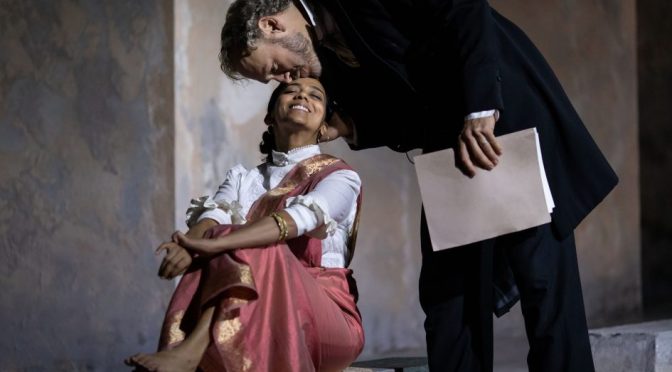Artistic director Rachel O’Riordan’s brief introduction to this chance to see her superb work online – unfortunately only for one day – was offered with “recovery and hope for the future” in mind. There’s the important call for donations, but also a reminder of theatre’s importance as a place for diversity, inclusion and seeing stories from different perspectives. Her choice of Tanika Gupta’s acclaimed version of Ibsen’s classic illustrates her point perfectly. It’s fantastic theatre.
While O’Riordan points out that the recording was for archival purposes, as opposed to broadcast, so the action is often shot from the Gods – this doesn’t detract from a show that sounds and looks great from the start – with music from Arun Ghosh and gorgeous design by Lily Arnold. And what is on offer here is very special. Gupta takes a plot from Ibsen, an urgent objection to hypocrisy and injustice, and deep psychological insight with complex characters. But transposing Ibsen’s Norway for India ruled by the Raj adds immeasurably – it’s one of the finest ‘new versions’ I’ve seen.
While Ibsen’s period setting is preserved, the extra layer of colonial and racial concerns adds power. Nora, now Niru, is married to a British official, and the prejudice she has faced, along with Indian unrest, form a backdrop for the action. Yet Gupta handles all this with a light touch that O’Riordan appreciates throughout. That’s important – some things said may shock but this would have been the characters’ everyday lives. Nuances of complicity and acceptance as much as anger at injustice are all present. Gupta is blunt about British rule, and particularly justice, but Indians are also criticised. And the patriarchy is a target, too.
If any of this sounds a little… worthy… Gupta also impresses by how exciting she makes the play. There’s a great sense of menace as “past evils and mistakes” circle around every scene. Dr Rank, the at-death’s-door depressive becomes a serious character, the flirtation with Niru queasily upsetting as well as erotic. Niru’s old friend Mrs Lahiri, who admits her jealousy, makes a great role for Tripti Tripuraneni while Das (Krogstad in Ibsen) is just as good. Das is the play’s villain, a “thoroughly nasty specimen”, but he is also a complex character as Assad Zaman adds real fire to the role.
The lead roles share Gupta’s skill with characterisation and the result is a triumph for both Elliot Cowan as Tom Helmer and Anjana Vasan as Niru.
Cowan’s character has a little too much resting on him in this version but it is still an effective disappointment to see how far he falls. His love for his wife, however misguided, convinces. Their marriage is developed with great detail. Vasan’s performance is suitably nuanced and incredibly rich: flirty, sulky, stubborn, hopeful and despairing, the common factor is an intoxicating energy. When it comes to a scene of Niru dancing, on display for Tom’s English friends so that plenty of uncomfortable connotations come to the fore, Vasan is truly riveting.
There is a strength behind Niru that is gripping. As the plot resolves, her dream of happiness is still broken and her “stern” look at Tom is fully justified: he insultingly offers her “classes” but Niru isn’t the playful pupil anymore. Moving to freedom with more resolution than Ibsen imagined, taking what’s best from her literary predecessor, Gupta gives us the ending we really want.
Available 20 May 2020
To support visit www.lyric.co.uk
Photo by Helen Maybanks

